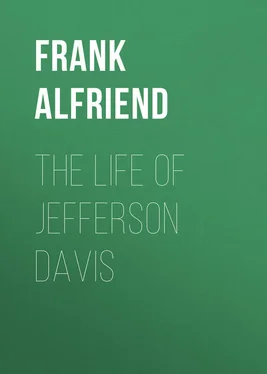Frank Alfriend - The Life of Jefferson Davis
Здесь есть возможность читать онлайн «Frank Alfriend - The Life of Jefferson Davis» — ознакомительный отрывок электронной книги совершенно бесплатно, а после прочтения отрывка купить полную версию. В некоторых случаях можно слушать аудио, скачать через торрент в формате fb2 и присутствует краткое содержание. Жанр: foreign_antique, foreign_prose, Историческая проза, на английском языке. Описание произведения, (предисловие) а так же отзывы посетителей доступны на портале библиотеки ЛибКат.
- Название:The Life of Jefferson Davis
- Автор:
- Жанр:
- Год:неизвестен
- ISBN:нет данных
- Рейтинг книги:3 / 5. Голосов: 1
-
Избранное:Добавить в избранное
- Отзывы:
-
Ваша оценка:
- 60
- 1
- 2
- 3
- 4
- 5
The Life of Jefferson Davis: краткое содержание, описание и аннотация
Предлагаем к чтению аннотацию, описание, краткое содержание или предисловие (зависит от того, что написал сам автор книги «The Life of Jefferson Davis»). Если вы не нашли необходимую информацию о книге — напишите в комментариях, мы постараемся отыскать её.
The Life of Jefferson Davis — читать онлайн ознакомительный отрывок
Ниже представлен текст книги, разбитый по страницам. Система сохранения места последней прочитанной страницы, позволяет с удобством читать онлайн бесплатно книгу «The Life of Jefferson Davis», без необходимости каждый раз заново искать на чём Вы остановились. Поставьте закладку, и сможете в любой момент перейти на страницу, на которой закончили чтение.
Интервал:
Закладка:
“Mr. Davis. Yes.
“Mr. Fessenden. I am glad to hear it, then.
“Mr. Davis. Yes. I have long sought for a respectable man who would allege the contrary.
“Mr. Fessenden. I make no allegation. I asked if he could say as much. I am glad to hear him say so, because I must say to him that the newspapers have represented him as making a speech in Mississippi, in which he said he came into General Pierce’s cabinet a disunion man. If he never made it, very well.
“Mr. Davis. I will thank you to produce that newspaper.
“Mr. Fessenden. I can not produce it, but I can produce an extract from it in another paper.
“Mr. Davis. An extract! then that falsifies the text.
“Mr. Fessenden. I am very glad to hear the Senator say so. I made no accusation – I put the question to him. If he denies it, very well. I only say that, with all the force and energy with which he denies it, so do I. The accusation never has been made against me before. On what ground does the Senator now put it?..
“Mr. Davis. Does the Senator ask me for an answer?
“Mr. Fessenden. Certainly, if the Senator feels disposed to give one.
“Mr. Davis. If you ask me for an answer, it is easy. I said your position was fruitful of such a result. I did not say you avowed the object – nothing of the sort, but the reverse…
“Mr. Fessenden. That is a matter of opinion, on which I have a right to entertain my view as well as the Senator his…
“Mr. Davis. Mr. President, I rise principally for the purpose of saying that I do not know whence springs this habit of talking about intimidation. I am not the first person toward whom a reply has been made, that we are not to carry our ends by intimidation. I try to intimidate nobody; I threaten nobody; and I do not believe – let me say it once for all – that any body is afraid of me – and I do not want any body to be afraid of me.
“Mr. Fessenden. I am. [Laughter.]
“Mr. Davis. I am sorry to hear it; and if the Senator is really so, I shall never speak to him in decided terms again.
“Mr. Fessenden. I speak of it only in an intellectual point of view. [Laughter.]
“Mr. Davis. Then, sir, the Senator was in a Pickwickian sense when he began; there were no threats, no intimidations, and he is just where he would have been if he had said nothing.” [Laughter.]…
While the Kansas question was pending in Congress, a sketch of Mr. Davis, in connection with two other prominent Southern Senators, which appeared in the correspondence of a leading journal, was extensively copied in the newspapers of the day. We extract that portion which relates specially to Mr. Davis. The portrait is from the pen of one who had no sympathy with his political views:
“Yesterday, when Hale was speaking, the right side of the chamber was empty, (as it generally is during the delivery of an antislavery speech,) with the exception of a group of three who sat near the centre of the vacant space. This remarkable group, which wore the air if not the ensigns of power, authority, and public care, was composed of Senators Davis, Hunter, and Toombs. They were engaged in an earnest colloquy, which, however, was foreign to the argument Hale was elaborating; for though the connection of their words was broken before it reached the gallery, their voices were distinctly audible, and gave signs of their abstraction. They were thinking aloud. If they had met together, under the supervision of some artist gifted with the faculty of illustrating history and character by attitude and expression, who designed to paint them, in fresco, on the walls of the new Senate chamber, the combination could not have been more appropriately arranged than chance arranged it on this occasion. Toombs sits among the opposition on the left, Hunter and Davis on the right; and the fact that the two first came to Davis’ seat – the one gravitating to it from a remote, the other from a near point – may be held to indicate which of the three is the preponderating body in the system, if preponderance there be; and whose figure should occupy the foreground of the picture if any precedence is to be accorded. Davis sat erect and composed; Hunter, listening, rested his head on his hand; and Toombs, inclining forward, was speaking vehemently. Their respective attitudes were no bad illustration of their individuality. Davis impressed the spectator, who observed the easy but authoritative bearing with which he put aside or assented to Toomb’s suggestions, with the notion of some slight superiority, some hardly-acknowledged leadership; and Hunter’s attentiveness and impassibility were characteristic of his nature, for his profundity of intellect wears the guise of stolidity, and his continuous industry that of inertia; while Toomb’s quick utterance and restless head bespoke his nervous temperament and activity of mind. But, though each is different from either of the others, the three have several attributes in common. They are equally eminent as statesmen and debaters; they are devoted to the same cause; they are equals in rank, and rivals in ambition; and they are about the same age, and none of them – let young America take notice – wears either beard or mustache. I come again to the traits which distinguish them from each other. In face and form, Davis represents the Norman type with singular fidelity, if my conception of that type be correct. He is tall and sinewy, with fair hair, gray eyes, which are clear rather than bright, high forehead, straight nose, thin, compressed lips, and pointed chin. His cheek bones are hollow, and the vicinity of his mouth is deeply furrowed with intersecting lines. Leanness of face, length and sharpness of feature, and length of limb, and intensity of expression, rendered acute by angular, facial outline, are the general characteristics of his appearance.”
The controversy, excited by the question of the admission of Kansas, can not be viewed as having terminated with the mere practical decision of her status, as a State tolerating or prohibiting slavery. Southern men had freely admitted the improbability of the permanent abiding of the institution in that Territory, or elsewhere, north of the line of 36° 30', and their defeat had a far more alarming significance than the exclusion of slavery from soil where the laws of nature opposed its location. Important conclusions were deducible from the lesson of Kansas, which the South must have been smitten with voluntary blindness not to have accepted. Of the purpose of the Republican party, never to consent to the admission of additional slave States, there was added to constantly accumulating proof from other sources, the bold declarations of Abolition members of Congress. Recent experience clearly demonstrated that the South could no longer rely upon the Northern Democracy in support of the plainest guarantees of the Constitution, for the protection of her property, when they were in conflict with the dominant fanaticism of that section. Accordingly, the Southern Democracy, wisely and bravely resolved, and the unfortunate issue should not prejudge their action, to require of their Northern associates, as the condition of continued coöperation, a pledge of better faith in the future.
It was in the progress of events, which may be justly called the sequel of the Kansas controversy, that Mr. Davis was most conspicuous during his second service in the Senate. His course was such as might have been anticipated from his zealous and vigilant regard for constitutional principles, and the rights and interests of his section. His feeble health had prevented his frequent participation in the struggles incidental to the Kansas question, but in those subsequent struggles, which marked the dissolution of the Democratic party, he was the constant, bold, and able adversary of Douglas. The ingenious sophistries of the latter were subjected to no more searching and scathing refutations than those with which Davis met his every attempt at their illustration.
Читать дальшеИнтервал:
Закладка:
Похожие книги на «The Life of Jefferson Davis»
Представляем Вашему вниманию похожие книги на «The Life of Jefferson Davis» списком для выбора. Мы отобрали схожую по названию и смыслу литературу в надежде предоставить читателям больше вариантов отыскать новые, интересные, ещё непрочитанные произведения.
Обсуждение, отзывы о книге «The Life of Jefferson Davis» и просто собственные мнения читателей. Оставьте ваши комментарии, напишите, что Вы думаете о произведении, его смысле или главных героях. Укажите что конкретно понравилось, а что нет, и почему Вы так считаете.












